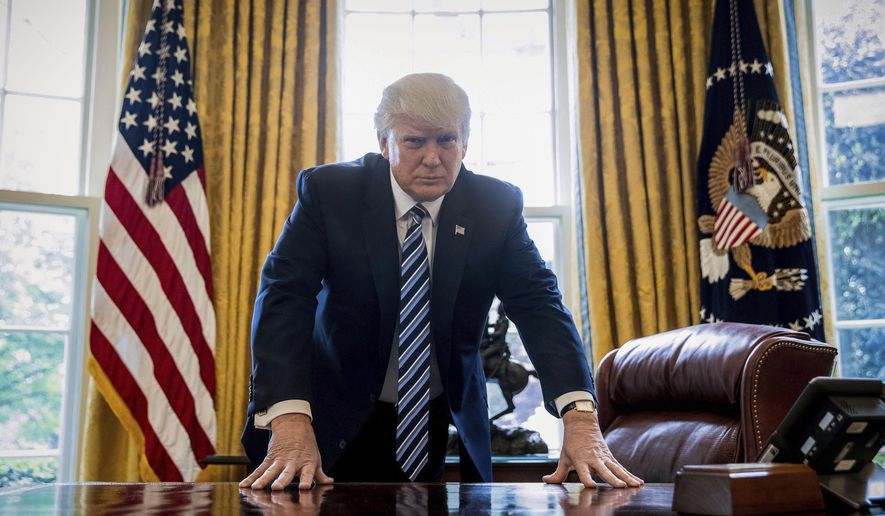The Trump administration announced late Monday that it will ask a question about citizenship on the 2020 census, moving to restore a critical but controversial piece of data from the decennial count.
Immigrant-rights groups had vehemently opposed the move, arguing it would rub some people the wrong way and scare them from participating, and would thus skew the count that is critical to doling out hundreds of billions of dollars in government aid and to fundamental democratic functions such as divvying up congressional seats.
Several minority-rights activists called it data “sabotage.”
But the Justice Department has asked for the question to be restored, saying they needed it to better enforce critical laws such as the Voting Rights Act.
Other government surveys ask about citizenship, but the Justice Department said those don’t get at the same level of granularity that the decennial census does.
Commerce Department Secretary Wilbur Ross made the final decision to add the question.
SEE ALSO: Eric Holder’s redistricting group plans to challenge citizenship question on 2020 census
He said it was part of the full census up through 1950, and even as late as 2000 was part of the Census “long form” that was sent to one in six families. In 2020, though, it will be part of the form that goes out to all families.
“I find that the need for accurate citizenship data and the limited burden that the reinstatement of the citizenship question would impose outweighs fears about a potentially lower response rate,” he wrote in a memo laying out his decision.
He dismissed concerns from some immigrant-rights groups who say the government would face a backlash from people who distrust it. He said that fear may come to pass, but it’s not tied to the citizenship question itself.
In fact, he said, nobody could specifically tie the citizenship question to lower responses.
He also said some opponents didn’t realize the question used to be standard on the Census.
The decision quickly prompted Democratic vows to reverse it, on two different fronts.
SEE ALSO: 2020 census citizenship question prompts California to sue Trump administration
In a tweet, Rep. Jose Serrano said he’d amend legislation to prevent the addition, though with Republicans in charge of both houses of Congress, it’s not clear whether his effort would succeed.
“Secretary Ross’ decisión to include a citizenship question in the 2020 census wil only result in a low count and fear. The question is another way to push for a low & unfair count. I will present amendment to undo this language,” he wrote.
And the state of California quickly promised another front in its series of legal battles with the Trump administration.
In a statement late Monday, California Attorney General Xavier Becerra announced the state would sue.
“We’re prepared to do what we must to protect California from a deficient Census. Including a citizenship question on the 2020 census is not just a bad idea — it is illegal,” he said.
Civil liberties and immigrant-rights activists last week had pleaded with the Trump administration not to pursue this path.
“The administration is trying to sabotage the 2020 Census with the addition of a citizenship question that it knows will chill participation among groups that it seeks to marginalize,” said Terry Ao Minnis, director of census and voting programs for Asian Americans Advancing Justice.
The Center for Immigration Studies, which advocates for stricter immigration limits, said people’s unwillingness to cooperate with the Census predates President Trump and so there’s no way to draw a correlation between bad reception to the citizenship question and any future drop in answers.
Citizenship is already asked on the Census’s American Community Survey, the Current Population Survey and the Survey of Income and Program Participation.
“Looking at the Census Bureau’s monthly Current Population Surveys shows no drop in the number of people identified as foreign-born between January 2014 and January of 2018,” said Steven Camarota, research director at the Center for Immigration Studies. “The months in which Trump announced his presidency, won the nomination or was elected president do not coincide with a falloff in the number immigrants who took part in the survey.”
Mr. Trump had proposed limiting spending on the Census Bureau, which normally would be ramping up now in preparation for 2020.
Congress, though, rejected Mr. Trump’s budget plans and delivered a major infusion of cash to the agency in the new “omnibus” spending bill, which census backers said puts the agency on a more solid footing.
Resistance to answering census questions has grown in recent years as some Americans have deemed the survey too intrusive, and have said the Constitution’s only requirement is for a count, not an answer to myriad further personal detail inquiries that appear on the decennial census. Refusal rates for the American Community Survey rose from 1 percent to 2 over the decade from 2006 to 2016.
• Victor Morton contributed to this article.
• Stephen Dinan can be reached at sdinan@washingtontimes.com.




Please read our comment policy before commenting.